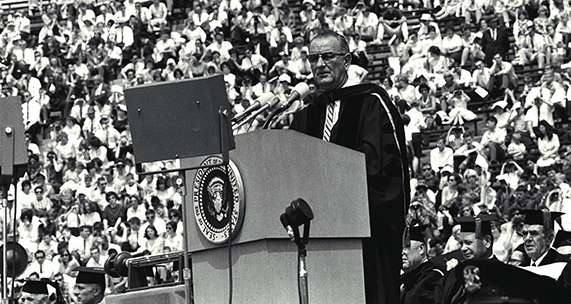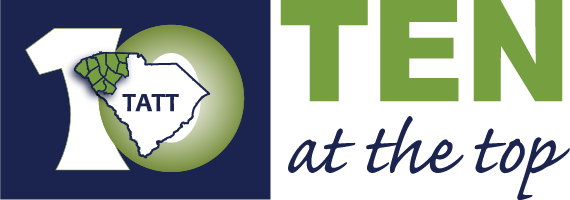
May 22, 2025 | Staying on Top
by Dean Hybl, Executive Director, Ten at the Top
It was in a speech at the University of Michigan 71 years ago, on May 22, 1964, that President Lyndon Johnson first outlined strategies to address poverty, racial inequality, and other social issues in the United States in an overall domestic agenda that would become known as the “Great Society”.
Among the programs and legislation developed as part of the agenda were the:
- Economic Opportunity Act of 1964: Created the Office of Economic Opportunity, including Job Corps and Head Start.
- Social Security Act Amendments (1965): Created Medicare and Medicaid.
- Elementary and Secondary Education Act (1965): Expanded federal funding for education.
- Civil Rights Act of 1964: Outlawed discrimination based on race, color, religion, sex, or national origin.
- Voting Rights Act of 1965: Eliminated discriminatory voting practices.
- Department of Housing and Urban Development: Established to address housing issues.
While like most people I have heard the “Great Society” referenced throughout the years, I didn’t really understand the totality of the effort and its goal to end poverty in the United States until recently reading the book “An Unfinished Love Story” by author and historian Doris Kearns Goodwin.
In the book, Kearns-Goodwin walks through the history of the 1960s using the more than 300 boxes of papers and memorabilia compiled by her husband, Dick Goodwin. Goodwin was a speechwriter and staff member in the White House for both John F. Kennedy and Lyndon Johnson.
It was, in fact, Goodwin who coined the phrase “Great Society” though he was just one of several advisors who helped Johnson frame the agenda.
One thing that struck me when reading about the early development of the “Great Society” agenda was the clear belief by Johnson and those around him that the effort could successfully end poverty across the United States.
As I think about what has evolved over the last 71 years and specifically where we are as a community and nation today, it strikes me that while the result of the work of Johnson and others helped create some measurable positive impacts, we are still dealing with most of the issues identified in the “Great Society” today.
The three pillars of the Great Society program were education, employment and healthcare. In addition to the development of the programs I highlighted earlier, it also created the National Endowment for the Arts, called for support for mental illness, and set the groundwork for the creation of the Environmental Protection Agency in 1970 during the administration of President Richard Nixon.
When looking at the work that Ten at the Top has been doing to support economic vitality and quality of life in the Upstate region over the last 15 years, I can’t help but see the connections between the idea of a “Great Society” where every person has the opportunity to thrive and the idea of Ten at the Top to build the collective capacity of businesses, organizations and communities across our Upstate region.
Since 2010, Ten at the Top has engaged Upstate leaders around such a wide array of issues that all are part of the goal of making this a better place for every person living in the region.
From air quality, transportation and education to senior needs, affordable housing, public safety, land use, mental health, entrepreneurial support and community vibrancy, communities, organizations and businesses across the region are working individually and have worked collaboratively on many of the issues vital to providing an opportunity for all people to achieve individual and collective success.
Though the optimism of those in the 1960s that creating the “Great Society” would end poverty in our country has certainly proven not to be true, I will say that the foundation created during that time has been critical to the gains that have been achieved across this region and country over the last 70 years.
As we move forward, we must not lose sight of the idealistic goal that we live in the wealthiest country in the world and by working together we can make this a place where every person can reach their full potential.
Dean Hybl, Executive Director, Ten at the Top
Ten at the Top is a non-partisan, non-profit organization with the mission of fostering collaboration and partnerships that create collective capacity and enhance the economic vitality and quality of life of the Upstate region. You can learn more at www.tenatthetop.org.

Aug 23, 2023 | Staying on Top
On Tuesday, Ten at the Top and the Upstate Mobility Alliance hosted a panel discussion regarding the future of transportation in the Upstate. The panel consisted of Mike Ruhe (Duke Energy), Ben Kessler (ChargePoint), Rob Bedenbaugh (SCDOT), and Mike McCauley (SC Electric Transportation Network).
To view the recording of the meeting, click here.
To view the presentation slideshow, click here.




Jul 13, 2023 | Staying on Top, Upstate Entrepreneur Ecosystem
Upstate Entrepreneur Ecosystem
July 12, 2023
The Upstate Entrepreneur Ecosystem met to engage with a panel of communications professionals who shared insight into the importance of marketing, branding, and storytelling for small businesses.
Kathryn Harvey (Neue South Co.), Kyle Brinkman (WSPA & WYCW-TV), and Sherry Jackson (Community Journals) served on the panel, while UEE facilitator Craig Scharton moderated the conversation. An engaging and well attended reception followed, provided by the host of the event Dray Bar and Grill at 1800 Drayton in Spartanburg.
View the slide deck here.




Mar 10, 2023 | 2023 TATT CHAT Recap, Staying on Top, TATT Chat
Guest Speaker
LaTorrie Geer
CEO, Commuinty Works
Click here to view a recording of the meeting
Click here to view the presentation
Resource Updates
AARP
To learn more about AARP, click here
Wholespire
To learn more about Wholespire, click here

Feb 9, 2023 | Staying on Top, Uncategorized

Welcome and Introductions: David Feild, Chairman of the Board
Local Public Health Strategies: Improving the Health of our Upstate Communities
Dr. Kandi Fredere, Region Director of SCDHEC

Click here to view a recording of the meeting
Click here to view the presentation
Resource Updates
Spartanburg County Environmental Enforcement Department
James Nelson shared updates and information on initiatives that focus on litter removal, and “Keeping Spartanburg Beautiful”. To learn more about Spartanburg County’s Environmental Enforcement Department, click the link above.
Jasmine Road
Jasmine Road provides help for women in need by providing safe housing, basic needs, life/job skills training, and more. To learn more about this incredible resource, click the link above.

Feb 7, 2023 | Staying on Top, UpstateVibe365

“I feel like Rooted in Love isn’t just a fake catchphrase here. You can really feel it,” said one Jasmine Road resident, smiling broadly from her chosen spot on the living room couch. “I can’t explain it, it’s just the love, the love.”
We truly believe in the transformative power of love; and time and time again, the women of Jasmine Road tell us that love really makes the difference for them — and this difference can mean life or death for the women we serve.
Love is truly at the heart of everything we do at Jasmine Road. The women here are offered unconditional love and the opportunity to flourish, and many, for the first time in their lives. Our program provides women with a sanctuary where they can start to heal, hope, and dream again, surrounded by a lifelong support network that is Rooted in Love.
Our most recent survivor-made candle that was launched last year is focused on that same love. In naming the candle, the women wrote these words about their experience at Jasmine Road and what love means to them:
“When I walked into this community, their arms were open and their hearts were free and there was no cost and no judgment. They are always like ‘let me love you until you see how to love yourself’. The women in this community have never given up on me and God never gave up on me, so I have no reason to give up on me.”
Jasmine Road is South Carolina’s first long-term program designed specifically for adult women survivors of sex trafficking, prostitution, and addiction. Our mission is to heal and employ women survivors, one life at a time. We do that by offering two years of safe housing, basic needs, mental and physical healthcare, therapy, time and space to heal, life and job skills training, and meaningful employment. More than 50 community partners join us in this work by providing much-needed trauma informed services to support each survivor’s comprehensive and individualized care plan.
Our unique social enterprise component gives women a safe, nurturing environment to learn sustainable job skills and find independence and economic mobility. Since launching our program in 2018, residents and graduates have booked more than 15,000 hours working at Jasmine Road and Jasmine Kitchen, our social enterprise lunch cafe, and in our jewelry and candle businesses.
To date, 100% of Jasmine Road graduates are in long-term sobriety, are safely housed, and are employed full-time. Many of the graduates are working in the Jasmine Road residential program and in the social enterprises, and several are employed by other organizations in the community.

One recent 2022 graduate worked full-time for Jasmine Road’s social enterprise lunch cafe Jasmine Kitchen, after completing culinary school at Truist Culinary & Hospitality Innovation Center, and recently accepted another position in the community. After graduation from Jasmine Road, she took on the parenting of her teenage daughter who lives with her full-time in housing as part of Homes of Hope’s affordable housing program. With more than two years of sobriety under her belt, she says at 50 years old she’s never going back to the life she led before. During her time at Jasmine Road, she participated in a workforce development program with Goodwill Industries and United Ministries, where she also took financial wellness classes and took advantage of a savings match program through Jasmine Road social enterprises. With her savings, she was able to purchase a car after getting her driver’s license reinstated. Her time at Jasmine Road also provided her with free trauma-informed therapy and medical care including a mammogram and colonoscopy, as well as extensive dental work, which ultimately helped her become an advocate for her own healthcare. The network of support at Jasmine Road and Jasmine Kitchen along with her addiction recovery community has been a foundation for her success and accomplishments.
By supporting our mission, you are helping us provide more women in our community with the opportunity for healing and real life change. The need is great for our program as we have received more than 300 applications for residency since Jasmine Road opened the doors of its first safe home in 2018.
We invite you to join us – visit our website at jasmineroad.org to learn more and be our guest for lunch at Jasmine Kitchen (503 Augusta Street, Greenville, SC 29605). All of our social enterprise products are made by the residents and graduates of Jasmine Road with love and the hope that more women in our community will find their way home, are available online at jasminekitchen.org. Follow us on Facebook and Instagram!















